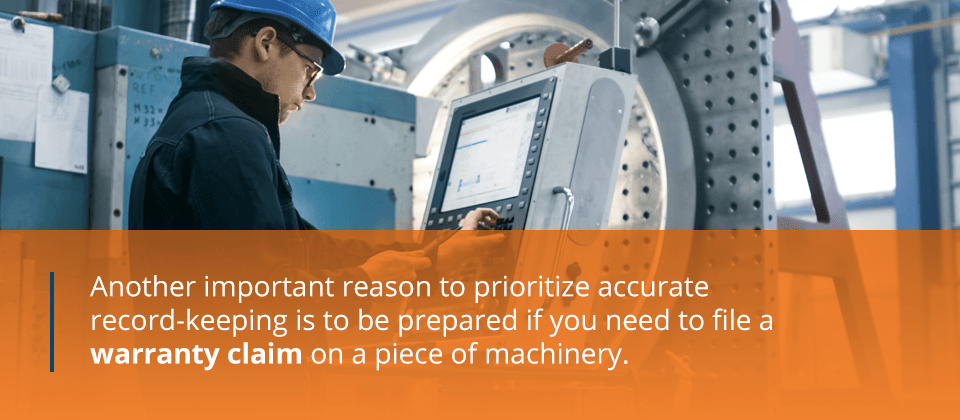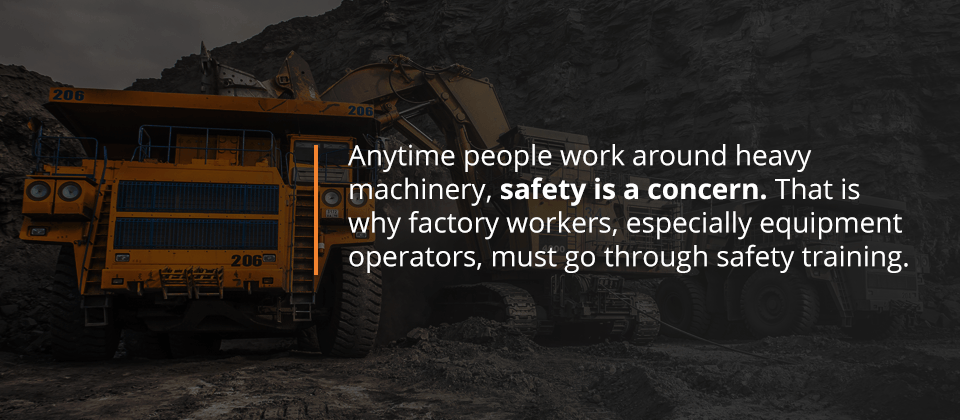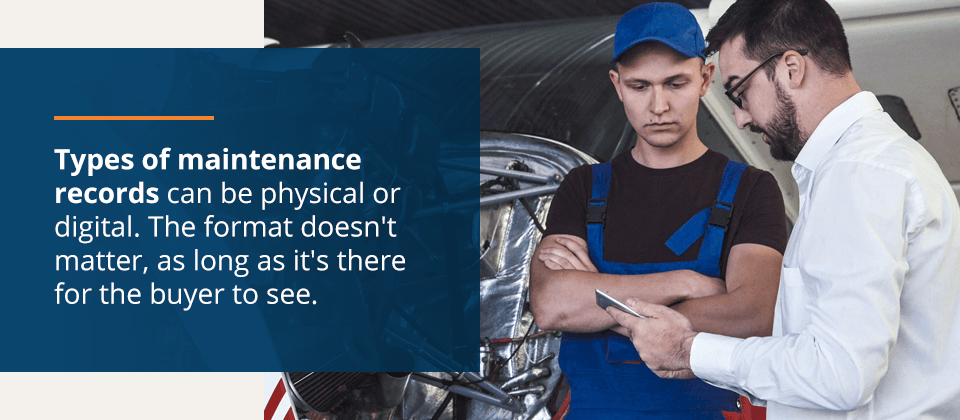
You know maintenance is an essential aspect of your business operations, but do you know record-keeping is a vital aspect of maintenance? In this post, we’ll discuss just how crucial proper documentation is for keeping track of equipment’s maintenance history and for making future determinations based on that data. Maintenance alone is helpful, but without consistent record-keeping, maintenance activities may get needlessly repeated, forgotten or occur at random intervals.
As we will see, proper maintenance record-keeping can save your company time, money and headaches. Keep reading to find out the importance of maintenance records and exactly what benefits your organization can expect to experience from keeping detailed maintenance logs, as well as what unfortunate scenarios you can avoid.
Prevent Expensive Repairs
Strategic maintenance comes down to keeping machines in good working order, rather than waiting until a significant equipment failure occurs to think about maintenance. Think of the saying, “A stitch in time saves nine.” When you let an underlying problem get out of hand, it turns into a much bigger disaster than if you addressed the underlying issue right away.

Addressing a problem you expect to crop up is called predictive maintenance, a type of proactive maintenance. Another form of proactive maintenance involves performing routine maintenance work on machines, regardless of how they appear to be performing. This method, known as preventive maintenance, should continuously keep equipment in tip-top shape.
If you don’t intervene with proactive maintenance and experience an equipment failure, you can expect a typical repair to cost somewhere from five to 15 times more than the maintenance effort that would have prevented it. In some cases, you may have to completely replace a piece of equipment, which could cost even more.
So, what does record-keeping have to do with all this? We’ve established it’s important to engage in proactive maintenance to prevent expensive repairs. To detect issues early on and respond, you need to have an organized system in place. Carefully kept records reveal when it’s time to perform a routine inspection, keep track of what inspections uncovered and note any minor repairs that have taken place.
If your records are inaccurate or incomplete, maintenance workers may not realize a machine is due for an inspection. Missing an inspection could result in a breakdown that costs valuable time and money to fix. If an assessment reveals a piece of equipment needs maintenance attention soon, but the records do not reflect that, this could also result in an easily preventable disaster. Failing to record repairs that have taken place can cause a whole host of problems, including causing unnecessarily repeated maintenance measures.
A complete record of a machine’s past inspections and repairs can also sometimes reveal the need to address a recurring issue. For instance, if you keep having to repair or replace a particular part because it’s worn down prematurely, perhaps that part is under too much stress, isn’t receiving proper lubrication or is experiencing some other issue.
Determining the underlying cause can allow you to address the issue to prevent that part from breaking down again in the future, which can save you even more money on maintenance. Of course, if your maintenance records are unreliable, you may miss out on the opportunity to detect these patterns.
Ward off Warranty Claim Problems

Another important reason to prioritize accurate record-keeping is to be prepared if you need to file a warranty claim on a piece of machinery. As the Federal Trade Commission points out, some warranties will only cover repairs, replacements or a refund if you abide by certain manufacturer-specified standards of maintenance. Your machine manual should include recommended guidelines for proper maintenance and should specify what you must do to retain your warranty. If you don’t have this information in writing, make sure you ask for it explicitly from the manufacturer.
It makes sense for manufacturers to have these standards, since even well-made machines need proper maintenance to function properly for the length of their intended lifespan. Ignoring these maintenance needs or not attending to them frequently enough voids your warranty because the machine wasn’t designed to handle that level of strain. For example, letting the oil levels in your hydraulic press drop too low, run too hot or become contaminated can cause a ripple effect of damage and can cause equipment to wear out more rapidly than it should.
Unfortunately, even when you properly maintain a machine, it could experience an unexpected breakdown. When an equipment failure occurs even though you have abided by the manufacturer’s recommendations for maintenance, it becomes crucial for you to demonstrate to the manufacturer that this is the case. When you can show the manufacturer a log that outlines all the maintenance work you’ve had done on the machine since you installed it, including dates and times for each repair or maintenance activity, it makes it clear what warranty claims you are entitled to.
These records make the whole warranty claim process simpler and more straightforward, as it leaves no room for confusion or disagreements between your company and the machine’s manufacturer. If a manufacturer questions your claim, you can quickly back up your statement with detailed records. Just the fact that you have these records at the ready demonstrates your commitment to responsible maintenance practices.
Keep Working Conditions Safe

Anytime people work around heavy machinery, safety is a concern. That is why factory workers, especially equipment operators, must go through safety training. According to the National Safety Council, the occupations that experience the highest number of workplace injuries that require workers to take time off work are:
- Police and firefighters
- Transportation and shipping
- Manufacturing and production
- Installation, maintenance and repair
- Construction
Notice that the use of heavy machinery is a common theme among most of these occupations. Even machines that are functioning correctly present a safety hazard to workers who don’t observe proper safety precautions. However, even when workers carefully operate equipment and interact with machinery in a way that is meant to ensure their safety, an equipment breakdown can present a significant safety hazard.
For example, faulty electrical equipment could cause severe burns or electric shock to anyone who contacts it. As with all types of equipment, electrical equipment requires adequate inspection and maintenance to make sure it’s in good condition and won’t create a safety hazard while in operation. No matter the type of equipment or machine, when it is well-maintained, it is far less likely to malfunction and cause injury to equipment operators and other workers.
The act of maintenance itself can become a dangerous activity when an equipment failure has occurred, particularly if the cause of the failure remains a mystery. Recall that maintenance is part of the National Safety Council’s list of top five industries that experience workplace injuries. However, not all types of maintenance are equally dangerous.
When you conduct preventive or predictive maintenance, generally, you’re working on a machine that is functioning properly. That tends to be much safer than working on machinery that has experienced a major problem, since you know what you’re dealing with rather than being afraid of unknown or unpredictable hazards. No matter what state the equipment is in, it is essential that maintenance workers observe safety measures while working on machinery.
How does documentation fit in here? Again, having an equipment’s maintenance history documented is key to helping your company keep track of your machinery’s health. One significant way it does this is through helping you stay on top of inspections. Routine inspections are crucial to finding potential causes of safety hazards before disaster strikes. It can also help you stay on top of critical maintenance activities that need to take place to keep machinery functioning properly in a way that keeps workers safe.
Increases Equipment’s Resale Value
Another situation where well-documented maintenance plays a vital role is when you decide to sell a piece of equipment. You may want to sell a machine if it becomes unnecessary to your operations or if you choose to upgrade to a newer or larger model. Whatever your reason for selling, potential buyers want to know the machine has been well-maintained. When you buy a piece of equipment new, you don’t have to worry about its maintenance history, but this should be a major concern for any buyer looking at used equipment.
You know this to be true if you’ve ever looked into buying a used car. The owner who is selling the vehicle may tell you they never wrecked the car, got the oil changed as soon as it was due each time, kept tires rotated and took all other necessary measures to keep the vehicle in good working condition.
That is just the sort of information you want to hear, but taking the owner’s word for it feels risky because, of course, it is. If the seller is someone you don’t know, it may be unwise to assume they’re telling the truth, particularly when your finances and safety are on the line.
Now, put yourself on the other end of a used equipment sale. You may know full well you have properly maintained and operated a piece of equipment you’re selling, but potential buyers probably won’t know you well enough to take you at your word. It’s not a personal slight — just precautionary skepticism. After all, as in the example mentioned above, their finances and the safety of their operators are on the line.

Here is where the saying “Seeing is believing” rings true. Even if a potential buyer is inclined to believe you, if you can show them a well-documented history to back up your claims, this will surely seal the deal. Types of maintenance records can be physical or digital. The format doesn’t matter, as long as it’s there for the buyer to see.
Having this documentation also allows you to justify and feel confident in a higher asking price, one that is fair considering the healthy state of the well-maintained machine. Responsible buyers would rather pay more for a piece of used equipment they know has been well cared for than pay a bargain price for a machine that experiences problems due to a history of inadequate maintenance.
Be Prepared to Replace Equipment After Disposal
Even the best-maintained, best-made machinery eventually comes to the end of its lifespan and needs replacing. While you can expect a machine to last a certain number of years or operating hours, its actual lifecycle depends on a variety of factors and is difficult to predict with surety.
However, when you have thoroughly documented a machine’s maintenance history, it can become clear when the equipment is beginning to near the end of its lifespan and will need replacing. You may see from maintenance records that specific problems are starting to occur more frequently or that the equipment is requiring more and more maintenance to function correctly. These are signs that the piece of equipment is no longer operating at peak performance and is beginning to decline.
When records reveal it may be time to retire a piece of equipment soon, you can prepare by lining up a new purchase or renting a piece of equipment to replace the aging machine temporarily. That is vital, since a significant investment or even rental decision can require a great deal of research and shopping around before you feel prepared and confident enough to make an informed decision. It is unwise to rush a decision over a machine that costs thousands of dollars and is a crucial part of your business’ operations.
If you don’t have records to reveal a piece of equipment is depreciating, you won’t be able to make these preparations. When equipment failure catches you off-guard and unprepared, your company can experience a significant amount of downtime. Operations could come to a complete and sudden stop if the piece of indisposed machinery is critical to your business. Unplanned downtime is, of course, the enemy of efficiency and profits, so you should avoid it at all costs.
Start Prioritizing Record-Keeping Today
As we have seen in this post, there are some important benefits to gain, not only from keeping your machinery well-maintained, but from documenting that maintenance, as well. You should prioritize record-keeping as one vital part of responsible maintenance practices. When you document maintenance, you can prevent expensive and unforeseen repairs, ensure warranty claims go smoothly, create safer working conditions for equipment operators, increase the resale value of equipment and can be better prepared to replace equipment after disposal.
If you want to learn more about ways to improve your maintenance practices, subscribe to our blog on the sidebar. Contact Global Electronic Services today if you want to learn more about how we can help your company keep your equipment properly maintained.

